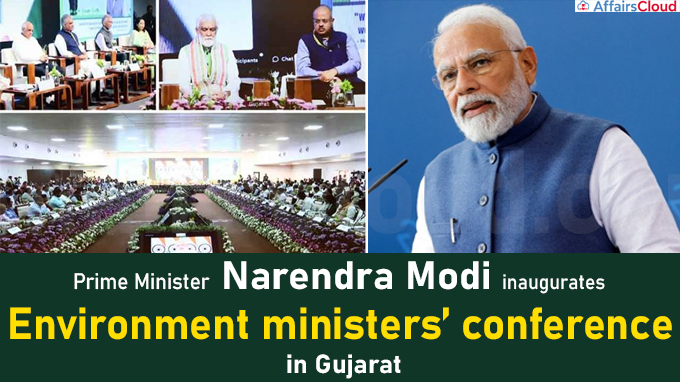
On September 23-24, 2022, a National Conference of Ministers of Environment, Forest and Climate Change (EF&CC) held in Ekta Nagar, Gujarat which was virtually inaugurated by the Prime Minister (PM) of India Narendra Modi.
- It is aimed at creating further synergy among the central and state governments on various issues.
The conference had 6 thematic sessions with topics focusing on LiFE, Combating Climate Change (Updating State Action Plans on Climate Change for Mitigation of Emissions and Adaptation to Climate Impacts); PARIVESH (Single Window System for Integrated Green Clearances); Forestry Management; Prevention and Control of Pollution; Wildlife Management; Plastics and Waste Management.
These are explained as below:
PARIVESH:
An acronym for Pro-Active and Responsive facilitation by Interactive and Virtuous Environment Single-window Hub, PARIVESH was launched in August 2018 to reduce time taken for granting Environment Clearance (EC) and Forest Clearance (FC) by combining several policy reforms viz. total 16 modules and more than 140 key functionalities.
i.It is a single window platform for administration of all Green Clearances, and subsequent compliance management.
ii.Some of the key modules envisaged in PARIVESH are Configurable Admin Module, Decision Support System (DSS), Know Your Approvals (KYA), Compensatory Afforestation Fund Management and Planning Authority (CAMPA) Management, Helpdesk Management, Legal Repository, Auditor Mgmt., Entity Ledger, Payment Gateway.
iii.It will strengthen the Minimum Government Maximum Governance.
iv.Currently the PARIVESH development work is in progress and is planned to be launched by the end of 2022.
Combating Climate Change and Summary of LiFE session.
The second thematic session was on Combating Climate Change and on Summary of Lifestyles for Environment (LiFE) session. It was presented by Parameswaran Iyer, Chief Executive Officer (CEO), NITI (National Institution for Transforming India) Aayog.
i.During the session, the role of Central and State Ministries and Departments of EF&CC was highlighted in facilitating implementation of Mission LiFE, which is an India-led Global Jan Andolan under which simple relatable actions across the world can be taken to protect the environment.
ii.The aim of Mission LiFE from 2022 -28 is to mobilize 2/3rd of the India’s Population to become pro-planet and to partner with at least 80 countries to make it Global Jan-Andolan.
iii.It will initially focus on 75 LiFE actions across 6 priority categories of e-waste, plastic waste, energy saving, water saving, recycling & reuse, and avoiding food wastage.
Key Points:
i.Updating State Action Plans on Climate Change (SAPCC) for Mitigation of Emissions and Adaptation to Climate Impacts were also discussed during the Conference.
- SAPCC are developed under the National Action Plan for Climate Change (NAPCC), an overarching policy framework for climate change mitigation and adaptation through its National Missions.
- SAPCC is a policy document of the State to reflect the strategies and policies with focus on climate change mitigation and adaptation in key sectors in the States and Union Territories (UTs).
ii.In August 2022, India has updated its National Determined contributions for 2021-2030. In line with the NAPCC, all the SAPCC are now being revised to align with the latest scientific insights, as well as with India’s NDCs under the Paris Agreement.
iii.A motivational session on Lifestyles for Environment was also taken by Sri Sri Ravisankar.
Plastics and Waste Management:
The third thematic session held was on Plastics and Waste Management which highlighted the Plastic Waste Management Rules 2016, a regulatory framework of management of plastic waste in India, a vision of making India Single-use Plastic free, and a mission of circular economy.
Key Points:
i.The capacity for processing of wastes viz. solid waste, hazardous waste, bio-medical waste, e-waste, plastic waste, construction and demolition waste has increased significantly in the last 8 years.
ii.The strategy adopted by the Government to tackle unmanaged and littered plastic waste is premised upon the following:
- Ban on single use plastic items which have high littering potential and low utility
- Implementation Extended Producer Responsibility (EPR) on plastic packaging
iii.Implementation of EPR on plastic packaging reduces littered and unmanaged plastic; promotes circular economy of plastic packaging waste; promotes development of new alternatives to plastics, and leads to sustainable plastic packaging.
- The EPR framework is implemented through a centralized online portal ensuring ease of doing business.
Wildlife Management:
A thematic session on Wildlife Management including Bio-Diversity and Conservation of Wetlands Biodiversity was highlighting India’s biodiversity hotspots, biogeographic zones, 16 forest types, 54733 floral and 103258 faunal species.
- For the proper regulation of these necessary legislation and institutional framework viz., Biological Diversity Act, 2002, National Biodiversity Authority (NBA), State Biodiversity Boards (SBBs), Union Territory Biodiversity Councils (UTBCs) and Biodiversity Management Committees (BMCs) have been constituted.
i.At present, there are 28 SBBs, 8 UTBCs, 2,76,895 BMCs and 2,67,345 People’s Biodiversity Registers (PBRs).
ii.Only 14 States have declared Biodiversity Heritage Sites (BHS), the remaining 22 states were urged to take necessary steps and Other Effective- Area Based Conservation Measures (OECM) to declare more such sites.
iii.For the conservation and management of wetlands in India, MoEF&CC undertook a four-point approach comprising of regulatory frame work, capacity building and outreach, implementation of National Plan for Conservation of Aquatic ecosystems (NPCA) and subsequent alignment with the Ramsar Convention.
About NPCA:
NPCA guidelines were released in March 2020 which aim at conservation and restoration of wetlands. This scheme is implemented on a cost sharing basis between the Central Government and respective State Governments.
- Till 31st March 2022 financial assistance has been provided to 164 wetlands across the country.
Agro-Forestry:
Agro-forestry, farm forestry and trees outside forests in general contribute to the increase in tree cover. MoEF&CC is also working towards the goal of bringing one third of the area under forests and tree cover.
i.In this regard, it brought out the Accredited Compensatory Afforestation Mechanism under the provisions of Forest (Conservation) Rules, 2022 to encourage individuals to raise vegetation on their land and sell it to persons who need to meet compensatory afforestation targets.
ii.MoEFCC urged all states to adopt National Transit Pass System (NTPS) for inter-state and intra-state movement of timber and forest produce with an aim to one nation-one pass.
Prevention and Control of Pollution:
Parallel sessions on Prevention and Control of Pollution (with a focus on National Clean Air Programme) were also held during the conference.
Pledges taken during the Conference:
Following 3 pledges were taken at the concluding session of the two days Conference at Ekta Nagar, Gujarat:
i.To promote the environment friendly lifestyle LiFE in order to tackle the global challenge of the climate change
ii.To enhance the Forest life, forest protection and green zones.
iii. To preserve wood and related products, to identify the opportunities for agri-commerce, to enable the policy framework related to scientific infrastructure and to increase the employment and income opportunities of the farmers, tribal groups and local communities.
Points to be noted:
i.India is committed to achieve net zero target for the year 2070.
ii.As of September 27, 2022, India has got the status of Ramsar site for 75 wetlands.
Swachh Vayu Sarvekshan
During the conference, MoEF&CC also released the guidelines for ‘Swachh Vayu Sarvekshan- Ranking of Cities’ which will rank 131 cities across India for the implementation of City Action Plans prepared as part of National Clean Air Programme (NCAP) for the reduction of air pollution up to 40% by 2025-26.
- The cities are categorized into three groups based on population. The first group of 47 cities with population more than 10 lakh, the second group of 44 cities with population between 3 to 10 lakh, and the third group of 40 cities with population less than 3 lakh.
- The ranking is based on the annual self-assessment of the cities based on the framework provided in the government portal.
About NCAP:
The NCAP is a long-term strategy that aims to achieve 20-30% reduction in Particulate Matter Concentration by 2024, with 2017 as the base year for comparison of the concentration. Specific plans were created for each city.
- These plans include strengthening of monitoring network, reducing vehicular/industrial emissions, awareness creation etc.
- Their implementation will be monitored by Committees at Central and State levels.
Other Participants:
Bhupendrabhai Patel, Chief Minister (CM) of Gujarat; Union Minister Bhupender Yadav, Ministry of Environment, Forest and Climate Change (MoEF&CC); Minister of State (MoS) Ashwini Kumar Choubey, MoEF&CC State Forest and Environment Ministers, the concerned State Secretaries, Principal Chief Conservator of Forests (PCCFs), among others.
Recent Related News:
i.On August 27, 2022, Union Minister Bhupender Yadav led the Beach Cleaning and Awareness Campaign alongside Union Territory (UT) of Puducherry’s Lieutenant Governor Dr. Tamilisai Soundararajan and Chief Minister (CM) N. Rangaswamy. The campaign at the Promenade beach was commemorated by schoolchildren and beach users taking a pledge in English and Tamil titled “I Am Saving My Beach.”
ii.On August 24, 2022, the Ministry of Environment, Forest and Climate Change (MoEF&CC) issued Battery Waste Management Rules, 2022 by replacing Batteries (Management and Handling) Rules, 2001 to ensure environmentally sound management of waste batteries.
About Ministry of Environment, Forest and Climate Change (MoEFCC):
Union Minister – Bhupender Yadav (Rajya Sabha – Rajasthan)
Minister of State (MoS) – Ashwini Kumar Choubey (Constituency- Buxar, Bihar)




